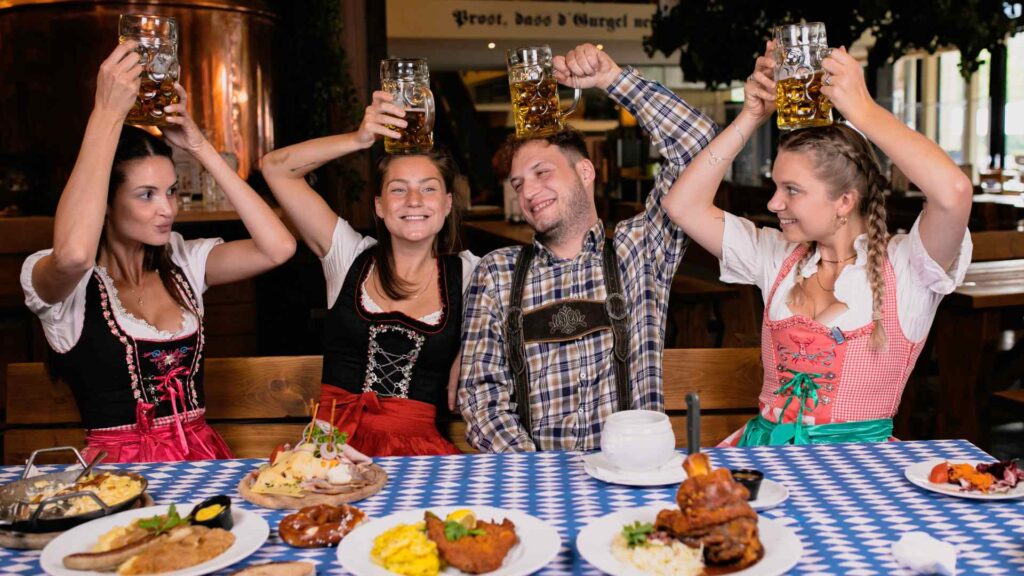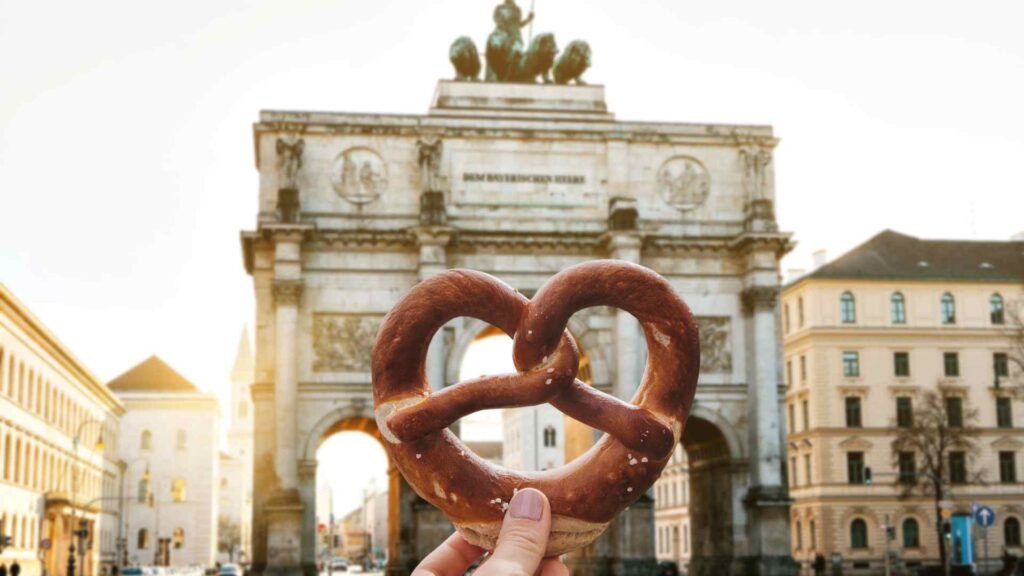German nicknames, or “Spitznamen,” reveal a lot about German culture, humor, and family dynamics.
This guide explores these affectionate terms, diving into their meanings, origins, and why they hold cultural significance in Germany.
From cute to quirky, each nickname offers insight into the German way of life.
What Are German Nicknames?
German nicknames, known as “Spitznamen,” are informal or affectionate names used among friends, family, and partners.
These names often highlight a person’s traits, physical characteristics, or emotions. In Germany, nicknames are common, ranging from playful and funny to romantic and cute. They provide insight into relationships, cultural values, and even humor.
Nicknames can be given to signify affection, to describe someone’s appearance or habits, or even as a joke. They can be based on animal symbolism, food references, or just a simple twist of a person’s actual name.

Why Are Nicknames Important in German Culture?
Nicknames play a significant role in German culture. They signify closeness and familiarity between people.
Using a nickname can express love, friendship, or affection, making it a symbol of intimacy. In Germany, friends, family, and lovers often use nicknames as a way of maintaining a close and affectionate bond.
Understanding the meaning behind these names is important for grasping their cultural significance.
A nickname like “Schatz” (treasure) signifies love and value, while “Dicker” (chubby) may be used jokingly among friends. This complexity highlights how nicknames form an integral part of the social fabric.
Common Themes in German Nicknames
Several themes are commonly found in German nicknames:
- Nature: German nicknames often use references to animals, plants, or natural phenomena, symbolizing qualities or affection.
- Animals: Terms like “Hase” (bunny) or “Bärchen” (little bear) are popular, reflecting cuteness or cuddly characteristics.
- Food: Nicknames such as “Schnuckiputzi” or “Zuckerpuppe” (sugar doll) play on sweetness and endearment.
- Personality Traits: Germans might use a nickname to highlight someone’s personality, like “Frechdachs” (cheeky badger) for someone mischievous.
- Historical or Cultural Influences: Some nicknames have historical roots, inspired by folklore, literature, or cultural figures.
Popular German Nicknames for Men
German nicknames for men often express strength, humor, or affection. Common examples include:
- Schatz (Treasure): One of the most popular nicknames in Germany, “Schatz” is used for someone special, like a partner, to indicate their importance and value.
- Bärchen (Little Bear): This cute term is often used for men, hinting at their cuddly or protective nature.
- Hase (Bunny): While usually associated with women, “Hase” is also affectionately used for men, conveying warmth and tenderness.
- Dicker (Chubby): Often used between male friends, this playful name isn’t meant to offend but to signal camaraderie and affection.

Popular German Nicknames for Women
For women, German nicknames tend to emphasize sweetness, cuteness, or beauty. Popular examples include:
- Maus (Mouse): This is a very endearing term used for women, often indicating that the person is adorable or precious.
- Schnucki (Cutie): A term of endearment, “Schnucki” is similar to “sweetie” or “cutie” and is used widely among partners.
- Engel (Angel): Used to emphasize someone’s purity or goodness, “Engel” is a romantic choice often used by lovers.
- Liebling (Darling): Another classic, “Liebling” can be translated as “dear” or “darling” and is a versatile nickname for anyone you hold dear.
Cute German Nicknames
Cuteness is a huge part of German nicknaming culture, and these examples showcase this:
- Spatz (Sparrow): Often used for children or loved ones, this nickname symbolizes something small and precious.
- Schmetterling (Butterfly): A poetic term to describe someone delicate or beautiful.
- Käfer (Beetle): Though it may sound odd, it’s used affectionately, hinting at something small and endearing.
- Häschen (Little Bunny): A diminutive form of “Hase,” this nickname is perfect for partners or children, expressing love and affection.
Funny German Nicknames
German humor often shines through in their nicknames. Examples include:
- Frechdachs (Cheeky Badger): For someone with a mischievous or playful nature.
- Stinkstiefel (Stinky Boot): Playfully teasing someone who might be a bit grumpy.
- Witzbold (Joker): Used for a person who loves making others laugh or play pranks.
- Quasselstrippe (Chatterbox): For someone who loves to talk, this term is both descriptive and endearing.
Romantic German Nicknames
Romantic nicknames in German culture emphasize affection and love:
- Süßer (Sweetie): A popular term between partners, highlighting someone’s lovable nature.
- Herzchen (Little Heart): A diminutive, emphasizing love and closeness.
- Liebchen (Little Love): An old-fashioned yet romantic nickname still in use today.
- Sonnenschein (Sunshine): A warm nickname used to describe someone who brings light and happiness.
Animal-Inspired German Nicknames
Animals feature heavily in German nicknames due to their symbolic meanings:
- Hase (Bunny): A common choice for partners, symbolizing warmth and affection.
- Bär (Bear): Suggesting strength and protectiveness, often used for men.
- Fuchs (Fox): Sometimes used playfully for someone clever or sly.
- Schnecke (Snail): Though unusual, it’s an affectionate term meaning someone slow but lovable.

Food-Inspired German Nicknames
Food-themed nicknames express sweetness or affection:
- Schnuckiputzi: A cutesy name combining “sweet” and “darling.”
- Zuckerpuppe (Sugar Doll): Emphasizing someone’s sweetness.
- Marzipanmäuschen (Little Marzipan Mouse): Combines a sweet treat with cuteness, often for children or partners.
- Knuddelbär (Cuddle Bear): Perfect for a loved one who enjoys cuddling.
Nicknames for Children
German parents often use special nicknames for their children:
- Mäuschen (Little Mouse): Expressing smallness and adorableness.
- Purzel (Tumbler): For energetic or playful children.
- Wonneproppen (Bundle of Joy): Used for chubby or cheerful babies.
- Sternchen (Little Star): Symbolizes someone who is special and bright.
Regional German Nicknames
Nicknames can vary greatly across Germany:
- Bavaria: “Bua” (boy) or “Dirndl” (girl) reflect Bavarian dialects.
- Berlin: “Keule” (buddy) is commonly used among friends.
- Hamburg: “Fischkopf” (fish head) is used humorously for locals.
- Saxony: “Bemme” (sandwich) can be an affectionate term.
Famous Historical and Literary German Nicknames
Some nicknames have historical significance:
- Der Alte Fritz (The Old Fritz): Refers to King Frederick the Great.
- Der ewige Student (The Eternal Student): From the literary character of the 19th century.
- Faustian: Derived from Goethe’s Faust, describing someone ambitious.
- Loriot: After a famous comedian, used for witty people.
How to Choose a German Nickname
When choosing a German nickname:
- Consider the person’s personality, traits, or appearance.
- Pick something affectionate yet appropriate.
- Think about their sense of humor—funny names work well for close friends.
- Avoid overly formal names; nicknames should feel personal and warm.
Do’s and Don’ts of German Nicknames
- Do: Use nicknames with close friends or family; it shows affection.
- Don’t: Use teasing names with strangers; it may be perceived as rude.
- Do: Choose culturally appropriate and respectful names.
- Don’t: Overuse or force a nickname if the person seems uncomfortable.
Frequently Asked Questions (FAQs)
What’s the most popular German nickname?
“Schatz” (treasure) is the most popular, used widely among partners.
Can nicknames be used in professional settings?
In Germany, it’s uncommon to use nicknames professionally unless there is close camaraderie.
Why are animal nicknames popular in Germany?
Animals symbolize qualities like strength, beauty, or playfulness, making them ideal for affectionate nicknames.
Is it okay to create your own German nickname?
Absolutely! As long as it’s affectionate and respectful, personalized nicknames are encouraged.
Are German nicknames gender-specific?
Many are, but some, like “Schatz” or “Liebling,” are gender-neutral.
How can I make a German nickname sound cute?
Adding diminutives like “-chen” (e.g., Häschen) makes a nickname sound smaller and cuter.
Conclusion:
German nicknames are more than just names; they are cultural expressions of love, friendship, and personality.
From adorable animal names to humorous and romantic terms, they reflect the German appreciation for affection and humor. Embrace these names, and you’ll gain insight into the warmth and charm of German culture.
